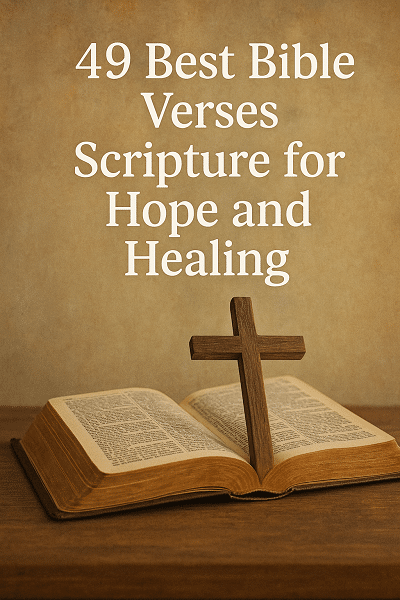Scripture for Hope and Healing isn’t just a phrase it’s a lifeline when you feel like you’re barely holding on. If you’re walking through pain, grief, or uncertainty, the right verse at the right moment can be like a breath of fresh air to your weary soul.
You’re not alone, and you’re not without help. In the words of ancient truth, there’s strength, comfort, and deep peace waiting for you. This article will guide you through powerful scriptures that speak directly into your situation—because healing is possible, and hope is closer than you think. Keep reading you need this.
Scriptures of Divine Promise and Comfort

1. Jeremiah 29:11
“‘For I know the plans I have for you,’ declares the Lord, ‘plans to prosper you and not to harm you, plans to give you hope and a future.'”
This reassuring verse reminds us that God’s perspective extends beyond our current circumstances. Even in times of illness or distress, we can trust that our suffering is not the end of our story, as God holds our future with care and intention.
2. Psalm 34:18
“The Lord is close to the brokenhearted and saves those who are crushed in spirit.”
When pain feels overwhelming, this verse offers the comforting truth that God draws especially near to us in our suffering. His presence becomes most tangible precisely when we feel most fragile, providing a healing closeness that sustains us.
3. Isaiah 41:10
“So do not fear, for I am with you; do not be dismayed, for I am your God. I will strengthen you and help you; I will uphold you with my righteous right hand.”
This powerful promise addresses the anxiety that often accompanies health challenges. God’s assurance of support reminds us that even when our own strength fails, His divine strength remains unwavering and available to us.
4. Psalm 147:3
“He heals the brokenhearted and binds up their wounds.”
This beautiful image of God as a compassionate healer speaks to His tender care for our emotional and spiritual wounds. Consider journaling about the areas in your life where you need God’s gentle binding and restoration.
5. Exodus 15:26
“For I am the Lord, who heals you.”
This direct declaration establishes God’s identity as Jehovah-Rapha, the God who heals. This foundational truth reminds us that healing in all its forms originates from God’s character and love for His creation.
6. Psalm 30:2
“Lord my God, I called to you for help, and you healed me.”
The psalmist’s testimony encourages us to bring our needs directly to God in prayer. This verse demonstrates that heartfelt cries for healing are heard and answered by a responsive God who cares about our suffering.
7. Psalm 103:2-3
“Praise the Lord, my soul, and forget not all his benefits who forgives all your sins and heals all your diseases.”
This comprehensive promise links spiritual healing (forgiveness) with physical healing, reminding us that God addresses our whole person. Try beginning each day by thanking God for specific ways He has brought healing to your life.
8. Matthew 11:28-30
“Come to me, all you who are weary and burdened, and I will give you rest. Take my yoke upon you and learn from me, for I am gentle and humble in heart, and you will find rest for your souls. For my yoke is easy and my burden is light.”
Jesus offers profound soul-rest to those exhausted by physical or emotional struggles. When healing takes time, this invitation to exchange our heavy burdens for His lighter load provides sustainable strength for the journey.
9. 2 Corinthians 12:9
“But he said to me, ‘My grace is sufficient for you, for my power is made perfect in weakness.’ Therefore I will boast all the more gladly about my weaknesses, so that Christ’s power may rest on me.”
This verse revolutionizes our perspective on weakness, showing that limitations become opportunities for experiencing God’s power. Rather than being discouraged by ongoing health challenges, we can see them as spaces where God’s grace becomes most evident.
Verses for Physical Restoration and Strength

10. James 5:14-15
“Is anyone among you sick? Let them call the elders of the church to pray over them and anoint them with oil in the name of the Lord. And the prayer offered in faith will make the sick person well; the Lord will raise them up.”
This practical instruction shows the importance of community in the healing process. Reaching out to spiritual leaders for prayer and support creates a powerful environment for God’s restorative work.
11. Proverbs 3:7-8
“Do not be wise in your own eyes; fear the Lord and shun evil. This will bring health to your body and nourishment to your bones.”
This verse reveals the connection between spiritual alignment and physical wellbeing. Humility before God and moral choices contribute to our overall health in ways modern medicine is only beginning to understand.
12. Psalm 41:3
“The Lord sustains them on their sickbed and restores them from their bed of illness.”
God’s care extends to the most difficult moments of physical suffering. When confined by illness, we can trust in His sustaining presence and restorative power that works even in our most limited circumstances.
13. Isaiah 53:5
“But he was pierced for our transgressions, he was crushed for our iniquities; the punishment that brought us peace was on him, and by his wounds we are healed.”
This profound prophecy about Jesus points to the ultimate source of healing Christ’s sacrificial work. Through His suffering, a comprehensive healing becomes available that addresses both our spiritual condition and physical needs.
14. Psalm 107:19-20
“Then they cried to the Lord in their trouble, and he saved them from their distress. He sent out his word and healed them; he rescued them from the grave.”
This historical account demonstrates God’s responsiveness to urgent prayers for healing. It highlights the power of God’s word itself as a healing agent in our lives, emphasizing the importance of surrounding ourselves with scripture during recovery.
15. Jeremiah 30:17
“‘But I will restore you to health and heal your wounds,’ declares the Lord.”
God’s direct promise of restoration speaks hope into situations that seem beyond recovery. This verse has provided comfort to countless believers facing serious illness or chronic conditions, reminding them that God remains committed to their healing.
16. 3 John 1:2
“Dear friend, I pray that you may enjoy good health and that all may go well with you, even as your soul is getting along well.”
This apostolic prayer reveals God’s holistic concern for believers’ wellbeing. It reminds us that physical health matters to God and is an appropriate subject for prayer, while also emphasizing the priority of spiritual wellness.
17. Acts 3:16
“By faith in the name of Jesus, this man whom you see and know was made strong. It is Jesus’ name and the faith that comes through him that has completely healed him, as you can all see.”
This New Testament healing story demonstrates the power available through Christ’s name. It encourages us to approach physical healing with faith in Jesus specifically, trusting in His continued ability to restore health and function.
18. Mark 5:34
“He said to her, ‘Daughter, your faith has healed you. Go in peace and be freed from your suffering.'”
Jesus’ compassionate response to the bleeding woman highlights the role of personal faith in receiving healing. Consider how you might reach out to Jesus with similar determination and faith when facing physical challenges.
Scriptures for Emotional Healing

19. Isaiah 61:1
“The Spirit of the Sovereign Lord is on me, because the Lord has anointed me to proclaim good news to the poor. He has sent me to bind up the brokenhearted, to proclaim freedom for the captives and release from darkness for the prisoners.”
This messianic prophecy, which Jesus applied to Himself, reveals God’s concern for emotional wounds. The divine mission includes specifically addressing heartbreak, showing that emotional healing is a central part of God’s redemptive work through Christ.
20. 2 Corinthians 4:16-18
“Therefore we do not lose heart. Though outwardly we are wasting away, yet inwardly we are being renewed day by day. For our light and momentary troubles are achieving for us an eternal glory that far outweighs them all. So we fix our eyes not on what is seen, but on what is unseen, since what is seen is temporary, but what is unseen is eternal.”
This perspective-shifting passage offers emotional healing by reframing our suffering within an eternal context. When we focus on God’s ongoing internal renewal work rather than external circumstances, we find emotional resilience. Try meditation on eternal realities when feelings of discouragement arise.
21. Psalm 73:26
“My flesh and my heart may fail, but God is the strength of my heart and my portion forever.”
When facing the emotional impact of physical decline, this verse offers profound reassurance. As our bodies and emotions encounter limitations, God Himself becomes our strength, meeting our deepest needs with His unchanging presence.
22. Philippians 4:6-7
“Do not be anxious about anything, but in every situation, by prayer and petition, with thanksgiving, present your requests to God. And the peace of God, which transcends all understanding, will guard your hearts and your minds in Christ Jesus.”
This practical prescription for anxiety offers a pathway to emotional healing through prayer. The verse promises supernatural peace as we transfer our concerns to God, creating an emotional protection that defies logical explanation.
23. Psalm 42:11
“Why, my soul, are you downcast? Why so disturbed within me? Put your hope in God, for I will yet praise him, my Savior and my God.”
The psalmist models honest dialogue with one’s own emotions, followed by intentional redirection toward hope. This verse teaches us that emotional healing often involves acknowledging our feelings while actively choosing to anchor ourselves in God’s faithfulness.
24. Romans 12:2
“Do not conform to the pattern of this world, but be transformed by the renewing of your mind. Then you will be able to test and approve what God’s will is his good, pleasing and perfect will.”
This verse reveals that emotional healing involves thoughtful renovation, as God transforms our thinking patterns. Try identifying negative thought cycles and replacing them with biblical truths to experience this mind-renewal process.
25. Isaiah 26:3
“You will keep in perfect peace those whose minds are steadfast, because they trust in you.”
This beautiful promise offers emotional stability through focused trust. Rather than depending on circumstances for peace, we find lasting emotional healing by fixing our attention on God’s unchanging character and promises.
26. Psalm 23:3
“He restores my soul. He guides me along the right paths for his name’s sake.”
This beloved psalm describes God’s tender soul-restoration work. When grief, trauma, or prolonged illness has depleted your emotional resources, this verse assures you that God specializes in renewing and refreshing damaged souls.
27. Romans 15:13
“May the God of hope fill you with all joy and peace as you trust in him, so that you may overflow with hope by the power of the Holy Spirit.”
This apostolic blessing reveals the supernatural source of positive emotions. When we struggle to manufacture hope or joy during difficult times, this verse reminds us that these emotions come through the Holy Spirit’s work as we maintain trust in God.
Scriptures of Patience and Perseverance

28. Romans 8:28
“And we know that in all things God works for the good of those who love him, who have been called according to his purpose.”
This comprehensive promise doesn’t guarantee immediate healing but assures us that God is working constructively through our challenges. When recovery takes longer than expected, remember that God is orchestrating good outcomes even from difficult situations.
29. Psalm 27:14
“Wait for the Lord; be strong and take heart and wait for the Lord.”
The repetition in this verse emphasizes the challenge and importance of patient waiting. When healing seems delayed, this scripture encourages us to find strength in active, hopeful waiting rather than passive despair. Consider implementing a prayer for patience and peace into your daily routine during extended recovery periods.
30. James 1:2-4
“Consider it pure joy, my brothers and sisters, whenever you face trials of many kinds, because you know that the testing of your faith produces perseverance. Let perseverance finish its work so that you may be mature and complete, not lacking anything.”
This challenging perspective reveals the developmental purpose behind prolonged suffering. Our endurance through health challenges can produce spiritual maturity that wouldn’t develop through quick fixes or easy solutions.
31. Romans 5:3-5
“Not only so, but we also glory in our sufferings, because we know that suffering produces perseverance; perseverance, character; and character, hope. And hope does not put us to shame, because God’s love has been poured out into our hearts through the Holy Spirit, who has been given to us.”
This progression shows how patient endurance through health challenges leads ultimately to deeper hope. When struggling with ongoing conditions, remember that your perseverance is developing qualities that will sustain you beyond your current circumstances.
32. 2 Corinthians 4:8-9
“We are hard pressed on every side, but not crushed; perplexed, but not in despair; persecuted, but not abandoned; struck down, but not destroyed.”
Paul’s resilient testimony encourages us to recognize the difference between difficulty and defeat. Even when healing processes involve setbacks, this verse reminds us that limitations need not become definitions—we can experience pressure without being destroyed by it.
33. Galatians 6:9
“Let us not become weary in doing good, for at the proper time we will reap a harvest if we do not give up.”
This agricultural metaphor encourages persistence in positive practices that support healing. Whether maintaining medical regimens, healthy habits, or spiritual disciplines, this verse promises eventual results for consistent effort, even when progress seems slow.
34. Isaiah 30:15
“In repentance and rest is your salvation, in quietness and trust is your strength.”
This verse redefines strength during healing seasons as peaceful trust rather than forceful striving. When physical limitations necessitate rest, we can view these quiet periods as spiritually productive rather than merely restrictive.
35. Psalm 40:1-3
“I waited patiently for the Lord; he turned to me and heard my cry. He lifted me out of the slimy pit, out of the mud and mire; he set my feet on a rock and gave me a firm place to stand. He put a new song in my mouth, a hymn of praise to our God. Many will see and fear the Lord and put their trust in him.”
This powerful testimony follows the complete arc from patient waiting through divine rescue to grateful praise. It encourages us that seasons of difficult waiting eventually give way to stability and joy that can inspire others on similar journeys.
Scriptures for Hope in God’s Faithfulness

36. Lamentations 3:22-23
“Because of the Lord’s great love we are not consumed, for his compassions never fail. They are new every morning; great is your faithfulness.”
Written from the depths of national catastrophe, these words offer hope through God’s renewable compassion. Each day of healing brings fresh opportunities to experience God’s faithful care, regardless of yesterday’s difficulties.
37. Psalm 91:14-16
“‘Because he loves me,’ says the Lord, ‘I will rescue him; I will protect him, for he acknowledges my name. He will call on me, and I will answer him; I will be with him in trouble, I will deliver him and honor him. With long life I will satisfy him and show him my salvation.'”
This comprehensive promise of divine protection spans immediate rescue through long-term satisfaction. It assures us that God’s response to our calls includes both presence in trouble and ultimate deliverance from it.
38. Isaiah 43:2
“When you pass through the waters, I will be with you; and when you pass through the rivers, they will not sweep over you. When you walk through the fire, you will not be burned; the flames will not set you ablaze.”
This vivid promise addresses our fear of being overwhelmed by difficult circumstances. It assures us not of exemption from trials but of preservation through them, with God’s presence moderating their impact on us.
39. Romans 8:38-39
“For I am convinced that neither death nor life, neither angels nor demons, neither the present nor the future, nor any powers, neither height nor depth, nor anything else in all creation, will be able to separate us from the love of God that is in Christ Jesus our Lord.”
This expansive declaration assures us that no circumstance, including health crises, can disconnect us from God’s love. When facing uncertain prognoses or chronic conditions, this unbreakable connection to divine love provides stable ground for hope.
40. Philippians 1:6
“Being confident of this, that he who began a good work in you will carry it on to completion until the day of Christ Jesus.”
This assurance of God’s persevering work counters our fear of abandonment mid-process. When healing seems incomplete, remember that God remains actively invested in your progress, committed to completing what He has started in you.
41. Hebrews 10:23
“Let us hold unswervingly to the hope we profess, for he who promised is faithful.”
This direct encouragement bases our hope not on fluctuating feelings but on God’s consistent character. In health challenges that involve emotional ups and downs, God’s unchanging faithfulness provides a reliable anchor for steady hope.
42. 1 Peter 5:10
“And the God of all grace, who called you to his eternal glory in Christ, after you have suffered a little while, will himself restore you and make you strong, firm and steadfast.”
This promise puts temporary suffering in perspective beside eternal restoration. It assures us that God Himself not just circumstances or medical interventions is actively involved in our strengthening and stabilization process.
43. Isaiah 40:28-31
“Do you not know? Have you not heard? The Lord is the everlasting God, the Creator of the ends of the earth. He will not grow tired or weary, and his understanding no one can fathom. He gives strength to the weary and increases the power of the weak. Even youths grow tired and weary, and young men stumble and fall; but those who hope in the Lord will renew their strength. They will soar on wings like eagles; they will run and not grow weary, they will walk and not be faint.”
This magnificent passage contrasts human limitations with God’s limitless energy. It promises supernatural strength renewal specifically to those who place their hope in God rather than personal resources, offering a powerful antidote to the fatigue that often accompanies healing journeys.
44. 2 Corinthians 1:3-4
“Praise be to the God and Father of our Lord Jesus Christ, the Father of compassion and the God of all comfort, who comforts us in all our troubles, so that we can comfort those with the comfort we ourselves receive from God.”
This verse reveals the multiplicative nature of divine comfort, which expands beyond our personal experience to benefit others. Your healing journey including its difficulties can become a source of authentic comfort to others facing similar challenges.
45. Psalm 62:5-8
“Yes, my soul, find rest in God; my hope comes from him. Truly he is my rock and my salvation; he is my fortress, I will not be shaken. My salvation and my honor depend on God; he is my mighty rock, my refuge. Trust in him at all times, you people; pour out your hearts to him, for God is our refuge.”
This psalm offers a comprehensive vision of God as our secure foundation during turbulent times. The invitation to “pour out your hearts” encourages honest emotional expression within the context of trust, creating a balanced approach to hope that acknowledges real feelings while maintaining confidence in God.
46. Hebrews 4:15-16
“For we do not have a high priest who is unable to empathize with our weaknesses, but we have one who has been tempted in every way, just as we are yet he did not sin. Let us then approach God’s throne of grace with confidence, so that we may receive mercy and find grace to help us in our time of need.”
This powerful reminder of Jesus’ empathy encourages bold prayer during health challenges. Because Christ understands human suffering personally, we can approach God confidently for the specific mercy and grace needed for our healing journey.
47. 1 Peter 1:3-4
“Praise be to the God and Father of our Lord Jesus Christ! In his great mercy he has given us new birth into a living hope through the resurrection of Jesus Christ from the dead, and into an inheritance that can never perish, spoil or fade. This inheritance is kept in heaven for you.”
This declaration grounds our hope in the historical reality of Christ’s resurrection and its implications for our future. When physical healing remains incomplete in this life, the promise of imperishable resurrection life provides a “living hope” that transcends temporary outcomes.
48. Psalm 121:1-2
“I lift up my eyes to the mountains where does my help come from? My help comes from the Lord, the Maker of heaven and earth.”
This simple but profound redirection of attention demonstrates how hope begins with looking to the right source. When tempted to fixate on discouraging symptoms or reports, this verse encourages us to deliberately shift our focus to the Creator who has power over all physical reality.
49. Revelation 21:4
“He will wipe every tear from their eyes. There will be no more death or mourning or crying or pain, for the old order of things has passed away.”
This ultimate healing promise describes God’s final resolution to all suffering. While we pursue and pray for healing in this life, this verse assures us that God’s eventual plan includes the complete elimination of pain and sorrow in a renewed creation.
Conclusion: Embracing God’s Healing Promises
These 49 scriptures reveal God’s multifaceted approach to healing addressing physical ailments, emotional wounds, and spiritual brokenness with equal concern and power. Through them, we discover that healing isn’t always instantaneous but is always intentional, guided by a loving God who understands our suffering intimately.
As you reflect on these verses, remember that healing isn’t merely about the absence of pain but about the presence of God’s peace in the midst of any circumstance. True healing ultimately brings us closer to God’s heart and purpose for our lives, sometimes through pathways we wouldn’t have chosen but that lead to deeper wholeness.
May these scriptures become living words of hope in your journey, anchoring you to God’s unchanging promises when emotions fluctuate and circumstances change. Whether you’re currently experiencing God’s healing touch or faithfully waiting for it, these biblical truths provide the spiritual foundation for genuine hope and sustainable healing.
Practical Ways to Use These Scripture Verses for Hope and Healing
- Create a Healing Scripture Journal: Write out these verses in a dedicated journal, adding personal reflections about how each one speaks to your specific situation. Consider including a forgiveness prayer to address any emotional barriers to healing.
- Develop Scripture Cards: Transfer your favorite healing verses to index cards or digital notes on your phone, categorized by physical, emotional, and spiritual healing. Review them during treatment sessions, doctor’s waiting rooms, or difficult moments.
- Establish a Morning Scripture Routine: Begin each day by reading one healing verse and incorporating it into your morning prayers for family to create a foundation of hope.
- Share with Your Support Community: Text a different healing scripture each day to friends or family members who are supporting your healing journey, or share them in a support group for those facing similar challenges.
- Create a Healing Scripture Playlist: Record yourself reading these verses slowly over gentle background music, or find audio Bible readings of these passages to listen to during rest periods or sleepless nights.
- Decorate Your Healing Environment: Display short, powerful healing verses on cards, small framed prints, or digital backgrounds in spaces where you spend recovery time. The visual reminders can lift your spirits during difficult moments.
- Pray the Scriptures: Transform these verses into personalized prayers, inserting your name or specific situation. For challenging circumstances, combine them with focused divine intervention prayer points.
- Scripture Breathing Meditation: Practice slow, deep breathing while mentally reciting short healing verses like “The Lord is my healer” or “By His wounds I am healed,” allowing the truth to penetrate your being.
Frequently Asked Questions
How do I use Bible verses for healing when I’m in severe pain?
When intense pain makes concentration difficult, focus on very short verses (like “Jesus wept” or “The Lord is my healer”) that can be easily remembered and repeated. Ask someone to read longer passages to you, or listen to audio Bible recordings. Remember that even brief connection with scripture can provide comfort. For those struggling with emotional pain from broken relationships, specific Bible verses for broken heart relationship can provide targeted comfort.
Can I combine medical treatment with faith in biblical healing?
Absolutely! Throughout scripture, God works through both supernatural intervention and natural means. Medicine and faith are complementary approaches to healing, not competing ones. Many healthcare professionals recognize the positive impact of spiritual practices on recovery outcomes. Consider starting appointments or treatment sessions with an opening class prayer adapted to your medical situation.
What if I don’t experience the healing I’m praying for?
This profound question touches on the mystery of God’s sovereignty. Scripture shows that healing sometimes comes in different forms or timelines than we expect. The apostle Paul himself had a “thorn in the flesh” that remained despite prayer. In these situations, verses about God’s sustaining grace and purpose in suffering become especially meaningful. The healing may come through changed perspective, deepened faith, or spiritual growth rather than physical change.
How do I maintain hope when healing is slow or uncertain?
Focus on scriptures that address patient endurance and God’s faithfulness across time. Establish realistic expectations by recognizing that many biblical healing stories involved processes rather than instant results. Connect with others who can share hope from their own healing journeys, and intentionally celebrate small improvements rather than focusing only on complete restoration.
Is it appropriate to pray specific verses for someone else’s healing?
Yes, praying scripture for others is a powerful way to intercede on their behalf. When doing so, maintain respect for their journey by avoiding prescriptive statements (“This verse means you should…”). Instead, offer the verses as gifts of hope and allow God’s Spirit to apply them uniquely to the person’s situation. If comparing healing journeys becomes an issue, remember that Bible verses about comparison can provide helpful perspective.
How do seasonal celebrations relate to healing scriptures?
Many faith traditions connect healing with particular seasons of the liturgical calendar. For example, Advent and Christmas emphasize God entering human suffering through incarnation, making verses for Christmas relevant to healing themes. Easter highlights resurrection power that offers ultimate healing hope. Consider integrating healing verses into seasonal reflections to experience their meaning in fresh ways.
Remember that the journey toward healing like faith itself often progresses one small step at a time. As you incorporate these scriptures for hope and healing into your daily life, may you experience God’s presence bringing comfort, strength, and restoration to your body, mind, and spirit.

Noah James is the author behind PrayersLand, a blog dedicated to inspiring faith, hope, and spiritual growth. With a deep passion for prayer and devotion, he shares heartfelt reflections, powerful prayers, and uplifting insights to strengthen believers on their spiritual journey. His writings aim to bring comfort, wisdom, and divine connection.

